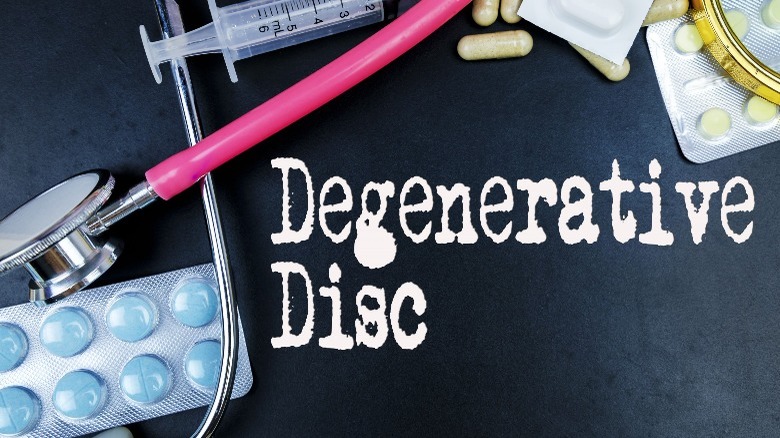Lingering Back And Neck Pain Might Be A Symptom Of This Condition
There are many beautiful aspects of aging. For example, as we age we get better at managing our emotions — and we may even be generally happier (per Smithsonian Magazine). On the other side of the coin, the body undergoes wear and tear throughout the course of life. For example, the cartilage of the joints in the hips, knees, and spine can begin to wear down (per Johns Hopkins Medicine). Within the spine, there are discs that lie between the vertebrae and act as a sort of cushion for shock (via WebMD). With time, those discs can lose water and dry out, leading to less effective shock absorption. The discs can also bulge or slip, which may affect nearby nerves, says WebMD.
When the disc(s) in the spine begin to break down, it can lead to a painful condition known as degenerative disc disease, or DDD (per SpineHealth). However, the name is a bit misleading. Pain related to DDD is not always degenerative — in the sense that it gets worse with time — and can, in fact, actually get better with time. It is also not a disease, but a condition that describes the natural degeneration (i.e., breakdown) of disc(s) in the spine. Here's everything you need to know about degenerative disc disease.
Degenerative disc disease: symptoms and treatments
Degenerative disc disease typically affects the lower back — called the lumbar spine — or the neck — called the cervical spine (via SpineHealth). The results often cause chronic pain and occasional flare ups of more intense pain. Since some nerves of the spine project out to different parts of the body, pain from degenerative disc disease can cause shooting pains in the arms or legs, called radicular pain. In addition to pain in the neck or lower back, WebMD says that other symptoms of degenerative disc disease include pain that can become more intense when bending, sitting, or twisting. You may feel relief from the pain when walking or lying down as well. In some cases, degenerative disc disease can cause feelings of numbness, or even a tingling sensation, in the arms and legs (per Cleveland Clinic).
WebMD says that there are many potential treatments for degenerative disc disease. Your doctor may recommend an over-the-counter anti-inflammatory medication like ibuprofen. In some cases, a steroid injection can help relieve the inflammation and pain. According to the Cleveland Clinic, there is a form of therapy that uses electricity to burn sensory nerves, which stops the pain signals from getting to the brain. In addition to physical therapy with a professional, there are also some home care routines for exercise, stretching, as well as applying heat and ice to help with the pain. In cases where symptoms do not improve, surgery may be necessary (per John Hopkins Medicine).


